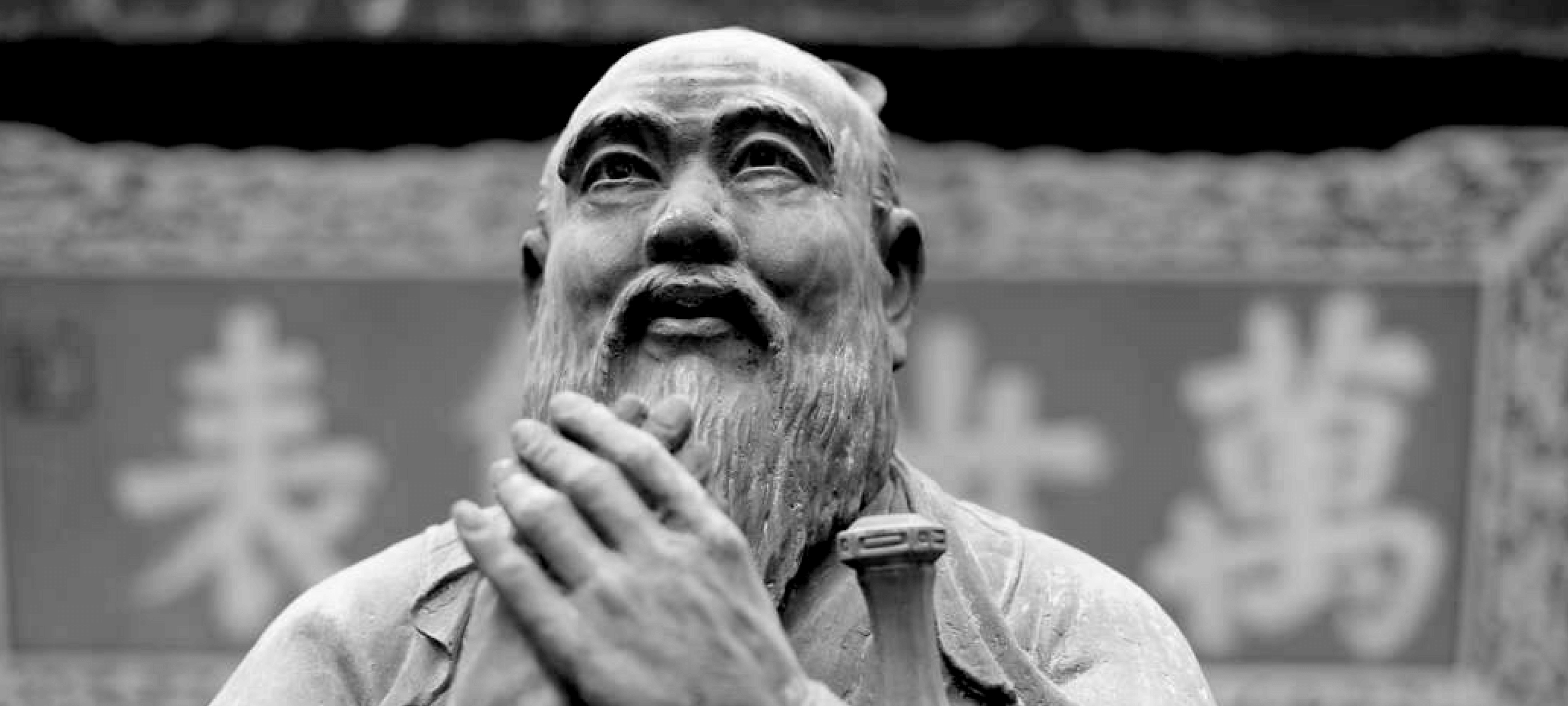
Big Thinker: Confucius
Big thinkerPolitics + Human RightsRelationships
BY The Ethics Centre 21 MAY 2018
Confucius (551 BCE—479 BCE) was a scholar, teacher, and political adviser who used philosophy as a tool to answer what he considered to be the two most important questions in life… What is the right way to rule? And what is the right way to live?
While he never wrote down his teachings in a systematic treatise, bite sized snippets of his wisdom were recorded by his students in a book called the Analects.
Underpinning Confucian philosophy was a deeply held conviction that there is a virtuous way to behave in all situations and if this is adhered to society will be harmonious. Confucius established schools where he gave lectures about how to maintain political and personal virtue.
“It is virtuous manners which constitute the excellence of a neighborhood.”
His ideas set the agenda for political and moral philosophy in China for the next two millennia and are emerging once again as an influential school of thought.
Humble beginnings
Confucius was born in 551 BC in a north-eastern province of China. His father and mother died before he was 18, leaving him to fend for himself. While working as a shepherd and bookkeeper to survive, Confucius made time to rigorously study classic texts of ancient Chinese literature and philosophy.
At the age of 30, Confucius began teaching some of the foundational concepts he formulated through his studies. He developed a loyal following and quickly rose up the political ranks, eventually becoming the Prime Minister of his province.
But at the age of 55 he was exiled after offending a higher ranking official. This gave Confucius an opportunity to travel extensively around China, advising government officials and spreading his teachings.
He was eventually invited back to his home province and was allowed to re-establish his school, which grew to a size of 3000 students by the time he died at age 72.
The golden age
Underpinning much of Confucius’ thought was a belief that Chinese society had forgotten the wisdom of the past and that it was his duty to reawaken the people, particularly the young, to these ancient teachings.
Confucius idealised the historical Western Zhou Dynasty, a time, he claimed, when living standards were high, people lived and worked in peace and contentment, the leaders carried out their duties in accordance with their rank, and the social order was stable and harmonious.
Confucius devoted his life to teaching the wisdom of this ancient society to his contemporaries in the hope of reinventing it in the present. For this reason, he didn’t claim to be an original thinker, but a receptacle of past wisdom. “I transmit but do not innovate”, he said.
Dao, de, and ren
While Confucius never wrote a systematic philosophical treatise, there are three intertwined concepts that run through his philosophy: Dao, De, and Ren.
Dao: Confucius interpreted Dao to mean a Way of living, or more specifically the right Way of living. This was not a concept he made up. It was already a central part of Chinese belief systems about the natural order of the universe. Dao is a slippery but profound concept suggesting there is a singular Way to live that can be intuited from the universe, and that all of life should be directed towards living this Way. If the Way is followed, the individual and society will be in perfect harmony.
De: Confucius saw De as a type of virtue that lay latent in all humans but that had to be cultivated. It was the cultivation of this virtue, Confucius believed, that allowed a person to follow the Way. It was in family life that people learned how to cultivate and practice virtuous behaviours. In fact, many of the main Confucian virtues were derived from familial relationships. For example, the relationship between father and son defined the virtue of piety and the relationship between older and younger siblings defined the virtue of respect. For this reason, Confucian ethics did not leave much room for an individual to exist outside of a family structure. Knowing where you stood in your family and your society was key to living a virtuous life.
Ren: While most Confucian virtues were cultivated within a strict social and family structure, ren was a virtue that existed outside this dynamic. It can be translated loosely as benevolence, goodness, or human-heartedness.
Confucius taught that the ren person is one who has so completely mastered the Way that it becomes second nature to them. In this sense ren is not so much about individual actions but what type of person you are. If you perform your familial duties but do not do so with benevolence, then you are not virtuous. Ren was how something was done, rather than the act itself.
Contemporary influence and relevance
Confucius’ influence on Chinese society during his life and in the two millennia since has been enormous. His sound bite like philosophies became China’s handbook on politics and its code of personal morality.
“He who exercises government by means of his virtue may be compared to the north polar star, which keeps its place and all the stars turn towards it.”
It wasn’t until Mao’s Cultural Revolution that some of the basic tenets of Confucian ethics were publicly denounced for the first time. Mao was future oriented and utopian in his politics, and so Confucius’ idea of governance and ethics based in the ancient classics was considered dangerous and subversive. In fact, Mao’s Red Guards referred to the old sage as “The Number One Hooligan Old Kong”.
But in the past decade, the Communist Party has realised Confucius’ teachings might be useful again. The surge of wealth that has accompanied free market capitalism in China has meant that many of Mao’s ideologies no longer make sense for the government. This has prompted a resurgence of State led interest in Confucius as an alternative ideological underpinning for the current government.
While this is seen by many as a way for China to build a political future based on its philosophical past, others feel that the Communist Party has emphasised Confucian ideas about hierarchical social structure and obedience, while sidelining notions of virtue and benevolence.
Follow The Ethics Centre on Twitter, Facebook, Instagram and LinkedIn.
Ethics in your inbox.
Get the latest inspiration, intelligence, events & more.
By signing up you agree to our privacy policy
You might be interested in…
Opinion + Analysis
Politics + Human Rights
Ask an ethicist: Why should I vote when everyone sucks?
Opinion + Analysis
Health + Wellbeing, Relationships
Pop Culture and the Limits of Social Engineering
Opinion + Analysis
Health + Wellbeing, Relationships
The ethics of smacking children
Opinion + Analysis
Health + Wellbeing, Relationships




